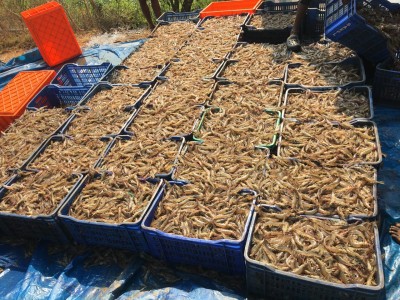By Sharon Thambala
Bhimavaram: The ongoing coronavirus pandemic and the consequent lockdown to curb it wreaked havoc with the livelihoods of hundreds of aquaculture farmers in the East and West Godavari districts of Andhra Pradesh.
With the outbreak of the pandemic and the ensuing lockdown, supply chains froze and logistical arrangements were crippled, leading to no buyers for the ready crop of grown up Vannamei (whiteleg) shrimp.
Dharapureddy Satyanaryana, 60, a shrimp farmer from Kalla village in West Godavari, said that he had spent Rs 6 lakh on a pond spanning an acre.
“When my crop of shrimp was ready for harvest and sale, Covid pandemic struck an irreparable blow. There was nobody to buy it,” Satyanarayan told IANS.
Satyanarayana had to sell off his two-wheeler and some land to repay the debt, and has now resorted to selling vegetables for his living.
Aquaculture in this part of the country is a complex business with multiple steps involved, and along with the rags-to-riches stories, there also are a number of riches-to-rags stories.
Aquaculture farmer and local YSRCP leader Talluri Rajkumar said it costs up to Rs 1 lakh to dig up an acre and transform it into a shrimp pond, which is then filled with 1 lakh hatched seed (young Vannamei shrimp) for feeding, culturing and growing their size to command a good price.
“Once you release the young prawns in the pond, then starts the four-month-long labour of attending to the shrimp, and caring for it like an infant… it demands all the attention of the farmer,” he said.
The process involves high expenditure running up to Rs 6 lakh per acre, as the farmer has to very carefully administer minerals, probiotics, sanitisers, maintain oxygen level and take several other steps to nurture the shrimp, he said.
“After the first 30 days, we net some shrimp every week to check their health, and meet experts for advice,” he said.
To meet all this huge expenditure, many farmers pledge their agricultural land or other assets to buy shrimp feed, medicines and others necessities to culture the prawns on credit with a promise to repay after a bumper crop.
Even after a farmer clears all these hurdles, the next step is to sell the shrimp to a company which buys, packs and exports shrimp.
This is where the pandemic hit Satyanarayana hard. With the sudden clampdown, he found no takers to buy his shrimp. Even if someone was ready, there was no transportation because of the lockdown.
“Because of coronavirus, I could not even catch my prawns. Within five days of the lockdown, factories shut down. By then, a virus started killing my shrimp,” he rued.
Satyanarayana tried frantically to find a buyer and found one only on the sixth day of his efforts, offering just Rs 150 for 50 count shrimp, that is 50 shrimps weighing 1 kg.
Bigger shrimps results in a lower count and commands a better price.
Shrimp at 50 count, in normal summer time, would fetch a price of Rs 300, and thus the half-price offer Satyanarayana received meant his investment and hard labour were to no avail.
When everything goes favourably, at 50 count, an acre can yield 2 tonnes of shrimp on an average, but his pond yielded only nine quintals as the rest died.
Taking advantage of his predicament amid Covid, the buyer further reduced Rs 5 for his shrimp to pay him a final amount of Rs 1.4 lakh.
According to sources, several local shrimp packing and export companies have formed a cartel to exploit farmers.
“These companies have outsourced shrimp buying from farmers to some brokers who are manipulating the price of shrimp during the pandemic and even otherwise,” said a local source.
Satyanarayana said he approached Undi MLA Mantena Ramaraju for help, but that did not lead to anything positive.
“I contacted Ramaraju’s aides for help… they replied that their own shrimp business was stalled. I contacted the factory people and also the businessmen who sold me the shrimp feed but nothing worked. The government also did not help us,” he complained.
Ice was not available, labourers were not available nor the district administration extended any relief, leading to a multi-pronged debilitating blow.
Attempts were made to contact West Godavari District Collector Revu Muthyala Raju to check if the government had extended any relief, but he did not respond to calls or messages.
In the past six months, there were many Satyanarayanas in the West Godavari and East Godavari districts, which have seen a large-scale conversion of paddy fields into prawn ponds, altering the centuries-old agricultural practices of the local people.
(Sharon Thambala can be contacted at thambalasharon@gmail.com)
Disclaimer: This story is auto-generated from IANS service.

